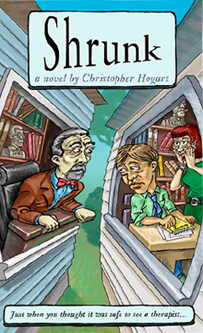“In Hogart’s debut comedic novel, a New England couple moves next door to an insane psychotherapist who dedicates himself to tormenting them.
Psychiatrist Henry Avalon and his wife, Helena, move into a new home in Cambridge, Massachusetts. Their new neighbor, Henry’s colleague Albert Prendergast, immediately comes off as socially awkward at best, and worrisomely weird at worst. Henry and Helena’s intuition about him turns out to be unfortunately correct, as Prendergast seems intenton harassing them both, personally and professionally. He leaves dead animals in front of their house, defaces their property, whistles at night to disturb their sleep, and leaves a sign in his window that reads “HOT RED SHORTS!” after Helena wears red, short pants in her garden. He demands that the Avalons build a fence around their property, and after they do, he throws rocks at it and files a false complaint with the local zoning board. When Henry confronts him, he shrilly screams a homophobic slur at him. Henry regularly calls the police about his neighbor’s antics, but without solid evidence, there’s little that the authorities can do. Later, Prendergast strategically claims to need therapy, solicits it from Henry, and then accuses him of malpractice before the state licensing board. Meanwhile, Henry’s reputation at work suffers—no one believes his stories, and his petty co-workers are threatened by his intelligence and success. One is overcome by “implacable hatred” when Henry proves more knowledgeable than he is at an informal book-club gathering. Another bizarrely jogs naked through the woods—with green and red makeup on his testicles.
Author Hogart is a psychiatrist who was a faculty member at Harvard Medical School for two decades, so he’s uniquely positioned to satirize his own profession. Henry’s colleagues, as the author hilariously portrays them, are as eccentric as they are venal; for example, Mendelson, a fellow psychiatrist, reveals himself to be neither capable of nor interested in genuine camaraderie when his wife asks him why he gives Henry the cold shoulder: “I thought I told you. The cost of friendship would have been to become involved in a problem of his.” Hogart also expertly mocks how some psychotherapists put stock in fashionable theories that are so incredibly general that they’re nearly impossible to falsify.
The Avalons, though, are shown to make some strange choices; early on, for instance, they decide that Prendergast’s misbehavior must be the result of loneliness and take out a personal ad on his behalf. Also, given how clearly they recognize their neighbor’s combination of malice and deviant behavior, it simply makes no sense that Henry would ever agree to become the man’s therapist. However, Hogart’s prose is quick-witted and slyly perceptive throughout. He has a comic sense of the absurd that evokes Kurt Vonnegut’s work and an eye for vanity that’s reminiscent of Tom Wolfe’s.
The author’s professional peers might be piqued by his novel’s ruthless characterizations, but the remainder of his readership is likely to be thoroughly amused.
An astute, farcical look at the psychiatric profession.” Kirkus Reviews
